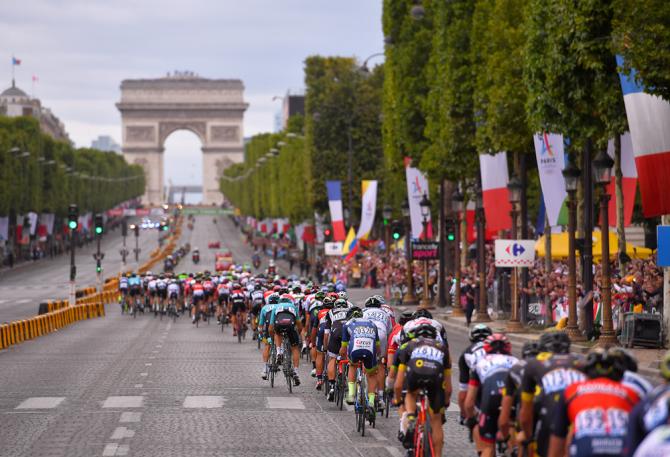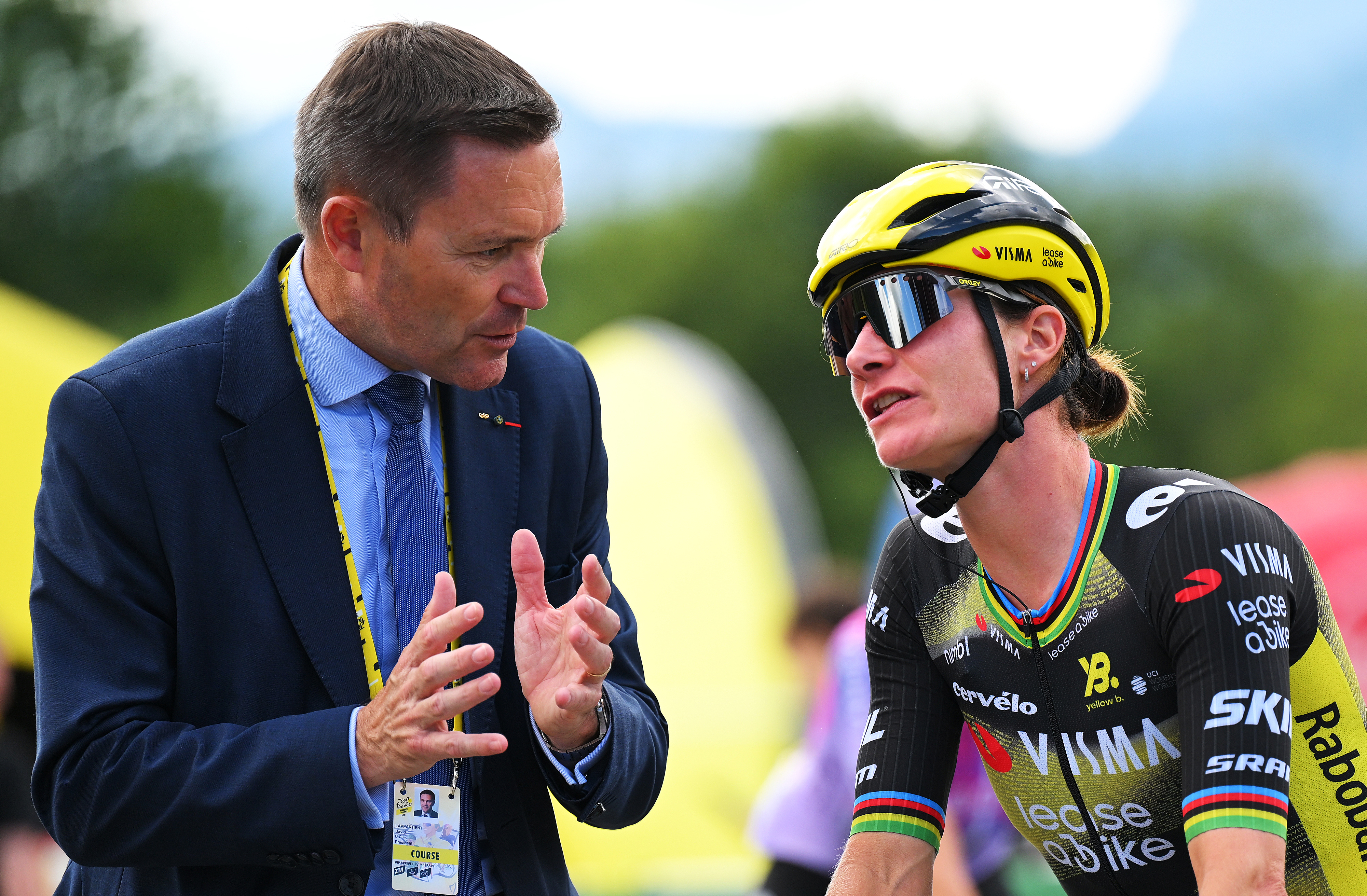Triumph on the Champs-Elysees: Jeff Pierce recalls his solo '87 win in Paris
USA Cycling's new director of elite athletics relives his biggest day on the bike
The latest race content, interviews, features, reviews and expert buying guides, direct to your inbox!
You are now subscribed
Your newsletter sign-up was successful
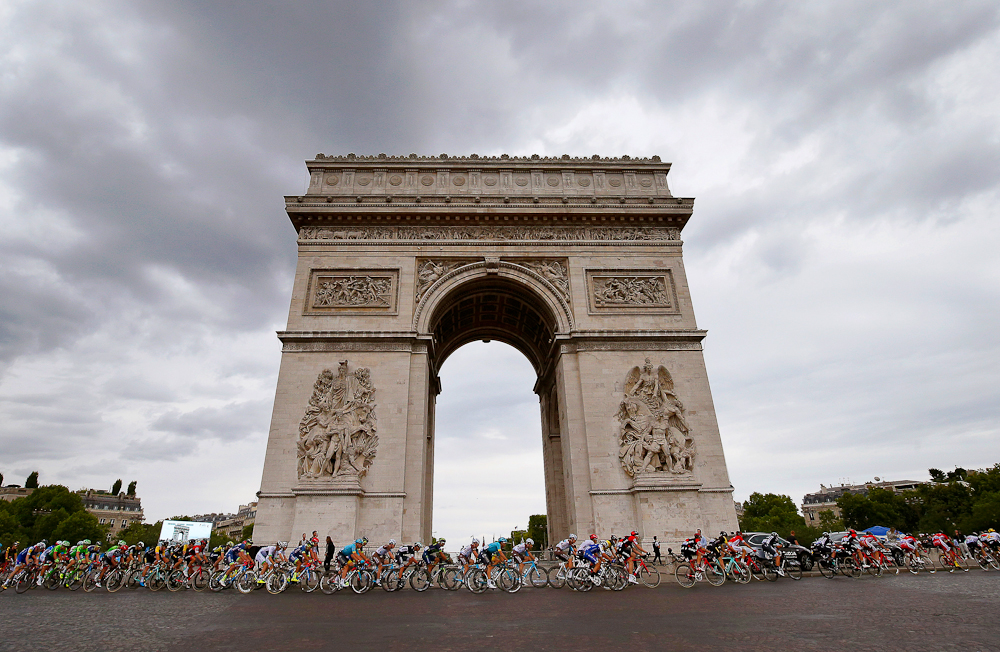
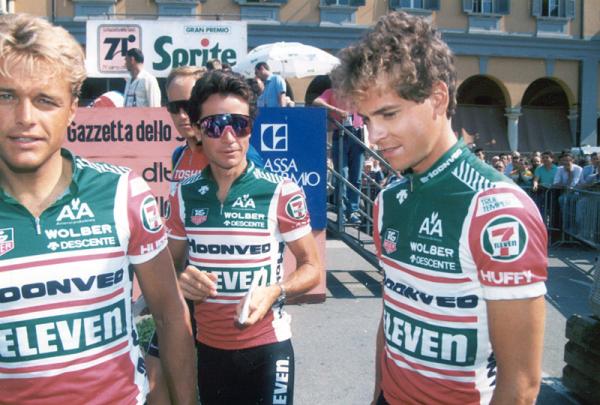
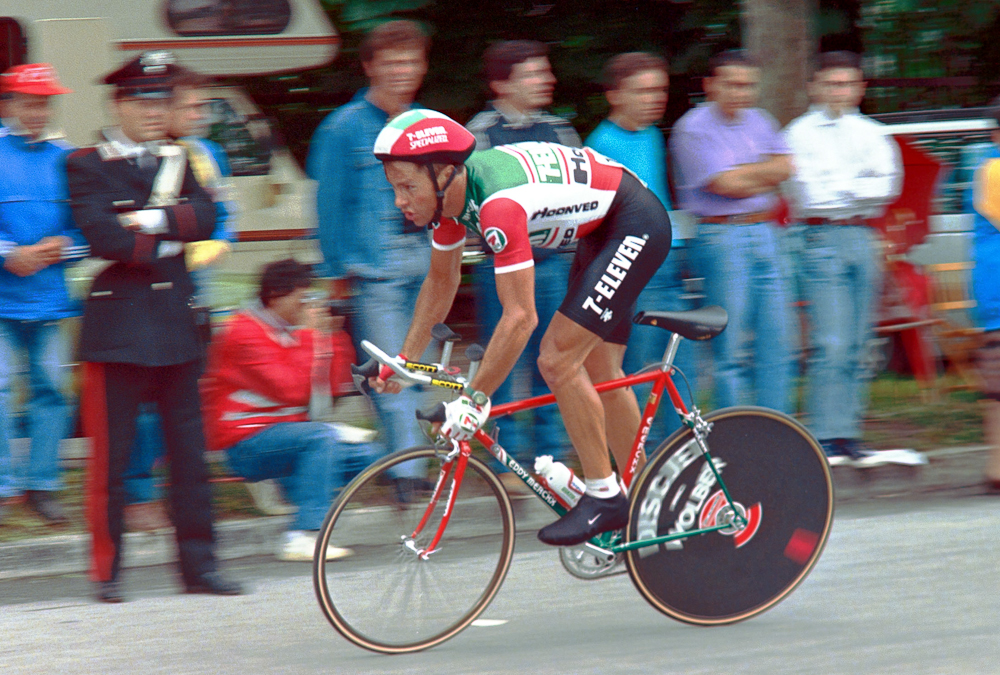
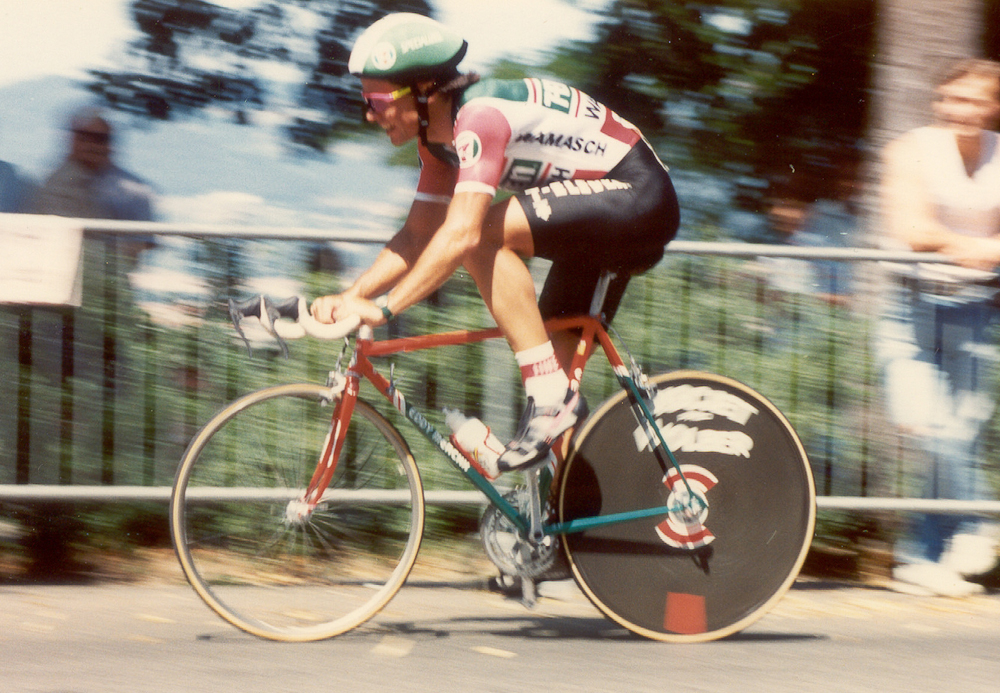
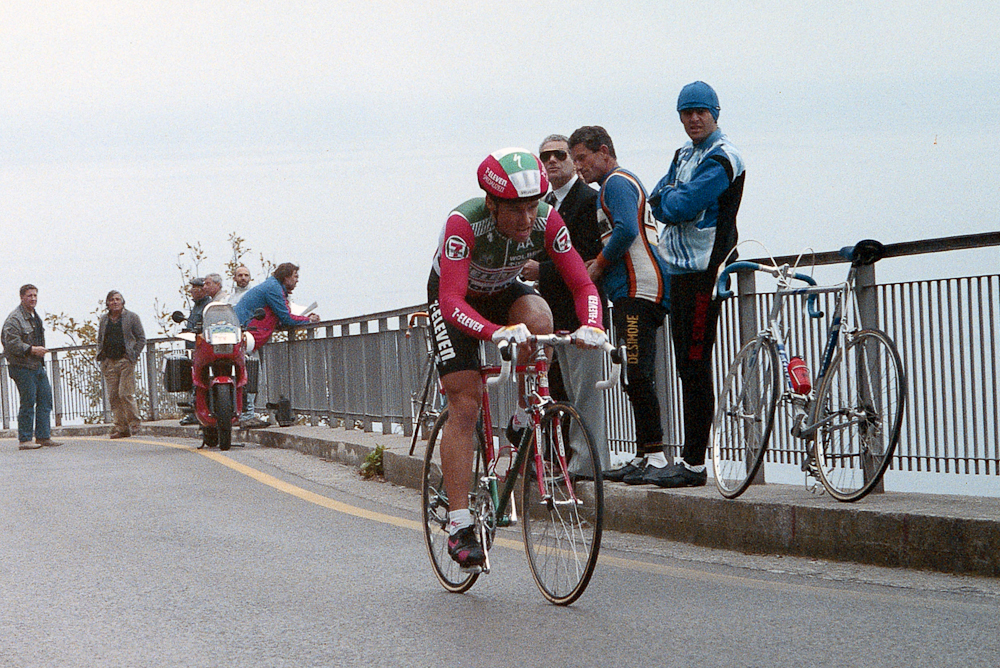
For Jeff Pierce, USA Cycling's new director of elite athletics, the final day of the Tour de France is more than just another bike race. Pierce took the biggest result of his career on the Champs-Élysées during the final stage of the 1987 Tour, winning the “sprinters' stage” with an audacious solo move to become only the third American to win a Tour stage and the first to do so in Paris.
It was an iconic moment for US cycling that pushed American racing further into the European consciousness – and in particular the fortunes of the 7-Eleven team – and it defined Pierce's cycling career until he retired after the 1996 season. Since Pierce's solo win, only Eddy Seigneur (Gan) has won a final road stage alone on the Champs-Élysées, beating Frankie Andreu (Motorola) in 1994 by three seconds from a small breakaway.
Ironically, some of Pierce's fondest memories from that day come via stories he was told rather than things he witnessed personally. He recalls hearing about how the Italian sponsor riding in the team car that day nearly tore the interior apart expressing his angst as race radio called out Pierce's exploits. In the days before the internet – and thanks to the American television network's tape-delayed coverage in the States – Pierce was also able to phone his parents after the stage and coyly suggest they make a point of tuning in. He checked back later to hear the stories about his family's over-the-top reaction.
Pierce raced three more seasons for 7-Eleven, finishing second overall at the Coors Classic in 1987, winning two stages at the ground-breaking Colorado race in 1988 and then taking a stage win at Pais Vasco in 1989. He returned to the States with the Chevrolet-LA Sheriff team through 1996, then retired and went to work with USA Cycling as the vice president of athletics.
Pierce later moved from USA Cycling into corporate America, living in the Pacific Northwest and working in wireless industry sales over the past 14 years. Now, with former vice president of high performance Jim Miller – who Pierce hired at USAC in 2001 – moving on and Scott Schnitzspahn taking over athlete athletics, the time was right for Pierce to return to the sport that he says is still a passion.
Even while working in the corporate world, Pierce continued to dabble in professional cycling; he coaches athletes along with wife Jo Kiesanowski, and he stepped in to drive a VIP car in the Tour of California race caravan. But his new job marks a full-time return to cycling.
“I'm super excited to be here, just trying to get the lay of the land and at the same time trying to make stuff happen, so it's exciting right now,” Pierce told Cyclingnews.
The latest race content, interviews, features, reviews and expert buying guides, direct to your inbox!
USA Cycling has set high goals for the upcoming 2020 Olympic Games in Tokyo, including seven medals, and both CEO Derek Bouchard-Hall and Schnitzspahn say Pierce will be a big part of the hoped-for success.
"In addition to his amazing career as a professional cyclist, pioneering the way for today's professional riders, Jeff has led our elite athletics program in the past, served for many years on our volunteer selection committee, coached some of our top riders, and has been an integral part of our recent talent identification camps," Schnitzspahn said. "He also had a very successful corporate management career. His background is unique and remarkably well-suited to serving America’s most talented road and track cyclists."
The Tour de France peloton heads toward the Arc de Triomphe (Tim de Waele)
'An incredible day' in Paris 31 years ago
[Cyclingnews caught up with Pierce earlier this week to talk about his historic win in Paris. Below is a transcript of Pierce's first-person recollection of that day. It has been edited lightly for length and clarity.]
That was a pretty unique day, to say the least. Now it's always so controlled. The style of racing is different. We were still racing on the last day. You weren't necessarily racing for the yellow jersey on the last day, that was still deemed as decided, but it wasn't just the sprinters' teams controlling everything.
They used to have a points competition for the teams as well as the individual. So 7-Eleven was winning that points competition, but it was really close between us, and I think it was PDM. We were duking it out. They took the best three places on points in the team and added them up, and that was your team points competition, just like your team competition based on GC with the top-three times.
We were going for the points competition and trying to seal that off on the last day. We had already had a fantastic Tour, so the pressure was off. We were just going to go out there and race and finish it off. [Team manager Jim Ochowicz] had given us a great talk before the race and said, 'Look, we've already won two stages, we've got the white jersey, we've had a great Tour.' [7-Eleven's Davis Phinney won stage 12 in Bordeaux, Dag Otto Laurtitzen won stage 14 in Luz Ardiden, and Raúl Alcalá was the best young rider - ed.]
Och said he was super proud of us and we should just go out and finish it off. We were just out there racing.
At that point Ron Kiefel was our best sprinter left in the race, so we were actually trying to set him up once we got onto the Champs-Élysées. I even went back at one point because Ron had flatted and pulled him back into the group, along with Jacques Boyer. So this is all happening on the circuits.
Later, as we got closer the finish – I think it was about two-and-a-half laps to go – I saw a move on the right-hand side and I was feeling good. I was toward the front on the left, and I could see out of the corner of my eye two shapes all of the sudden moving a lot faster, and I'm like, 'That looks like a good move.'
I accelerated on the left. Someone latched onto me and we kind of met up at the front. Next thing you know we had four guys off the front with a little bit of a gap. More and more people trickled up, and at two to go I think we had probably seven or eight. By the time we hit the line at one to go we probably had 12 guys up there. That may not be exactly right. It was 31 years ago. There may have been 15 up there or 12, but it was a pretty good bunch and we had about half a minute on the field.
So at that point I was thinking I'm the only one from 7-Eleven in there, so I was like, 'Alright, I gotta get a good finish.' I was looking at the group and thinking I could beat most of these guys in a sprint. I had a criterium background from racing in the US so much, so I actually had an OK sprint. I actually grew up racing on the track, too.
The race kind of settled in and somebody attacked right at one lap to go. They got away, and I remember sitting at the back looking at this. Everybody kind of filed into single file, jamming up the gutter where it was slightly smoother on the right. We made the U-turn at the Arc de Triomphe, and coming back on the other side we made contact with the guy that had attacked.
I was sort of sitting at the back watching everything unfold. There were a couple of small counters, and then it started to bunch slightly. I looked at that and said, 'Boom! Go!' And I just attacked as hard as I could. It wasn't really a planned thing. I was just racing. It was just instinctual and I went with it, but apparently I was moving pretty fast.
They hesitated for just a second when I first attacked, because they weren't quite sure what to do with me. A lot of them weren't super familiar with all the Americans yet. [Steve] Bauer was in that group, too, and he certainly knew me and a few of the others as well.
I opened up a gap pretty fast. I think it was at that sweet spot in the race; we still had, I think, 4km to go to the finish, so we were close enough that they didn't want to expend any energy and ruin their own sprint, but at the same time we were far enough away that they're thinking going to get me, that I won't last. There's that point in a lot of races, where a move like that – if it's not being completely controlled and people are actually racing – that it can work.
I just put my head down. I was just riding, taking it all in and sort of watching the road go by underneath me.
You go through a tunnel on the bottom near the park where the Louvre is. You go under a tunnel and you come up on the other side, make a left and shortly thereafter is where you see the red flag. Back then it was literally a wire line across the street with a simple red triangle hanging off of it – not a giant inflatable banner or any of this other stuff – so you really had to look for it.
But I saw it, right? I saw it, and I was like, 'Ah, 1k to go.' So I'm listening to the announcers, and I hear these French words coming out, and then every once in awhile, 'Pierce!' And I'm like, 'Hey, that's me.' It was like the Charlie Brown cartoon where the adults are talking and you just hear this, 'Wah wah wah.'
I'm hearing all this French and it's getting more and more excited, and I hear my name, 'Pierce,' and it kind of snapped me out of this trance or whatever it was. I was just riding and just kind of focusing on what I was doing. Then I was like, 'Holy crap. There's 1k to go. I'm probably 15 seconds in front of the closest guy. I'm about to win the final stage of the Tour de France.'
About that same time the conscious part of me realized, 'Oh, you're dying right now. You're dying big time. You cannot keep this pace up all the way to the line. Oh, shit.' I had to back off. I realized if I kept going I was going to blow, they were all going to catch me and it was going to be a disaster, and that was not my plan at that moment. I knew I had to keep going but try and recover and figure out when I could make that final push for the line.
I still had a pretty good gap, but I did another check and I saw Steve Bauer coming out of the group from behind. The group had started splintering. He had a pretty distinct silhouette, so I looked back and could see it was Bauer, and he was coming.
You go around that last turn, and I just remember looking up at the line. I wasn't consciously all there. I was floating around in some other realm of consciousness, but I knew Bauer was coming, I knew I was dying and I was trying to figure out where can I go, when can I go?
It turned out it was right about the moment Bauer caught me was when I felt – and I didn't know he had caught me, but I see this on video now. I was checking him. I picked this up a few years ago on a video, and I was like, 'Holy crap, he's being sneaky.' Because I checked and I could see him coming. The next time I looked over my shoulder he dove to the right side of the road so I wouldn't spot him over my shoulder. Sneaky bastard. Why else would he dive to the right side of the road as he sees my head start to turn to check where he's at? He was a smart racer.
That was right when he was catching me, and it was also the moment I knew I could go all out to the line, and he had just spent everything trying to contact with me. The moment he got close to my rear wheel was right when I took off and basically held it all the way to the line.
It was a pretty wild day, and I can still remember all of that as it played out. It's funny, I still see different videos sometimes and I'll see stuff I don't remember. Your old memories play games with you too sometimes. But it was really just a phenomenal experience and an incredible day.
Growing up in Missoula, Montana, Pat competed in his first bike race in 1985 at Flathead Lake. He studied English and journalism at the University of Oregon and has covered North American cycling extensively since 2009, as well as racing and teams in Europe and South America. Pat currently lives in the US outside of Portland, Oregon, with his imaginary dog Rusty.
